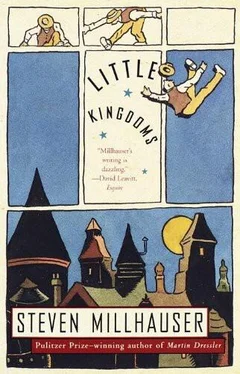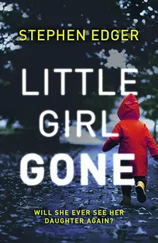That evening, when Cora came down to the front porch after getting Stella ready for bed, Franklin went up to tell her the next installment of a continuing bedtime story about a little girl who discovered in her dark attic a bright country of dolls. When he returned to the porch he sat for a while jiggling an ankle and then rose and said he’d be back in two minutes. Two hours later he returned guiltily from his study and was relieved to find Max talking easily with Cora; and throwing himself down on the cushion of a wicker chair Franklin felt a burst of gratitude to Max for getting on so well with Cora, for being such an easy and undemanding guest.
One afternoon toward the end of September, Franklin was working in his office at the World Citizen when Max entered and announced that he had found a distributor. “A what?” Franklin asked, looking up from a page covered with sketches of noses. He was pleased with his latest strip, which in certain ways was the best thing he had ever done, but Kroll had not been enthusiastic. “We’ve got to have a more appealing hero,” he had written in a long memo, “someone the public can take to their hearts,” and although Franklin understood exactly what Kroll meant, he was disappointed and even shocked — couldn’t Kroll see that what he was doing had an appeal of its own? Kroll liked domestic strips with strongly developed gags, as well as the working-girl strips that had recently come into vogue; he had never really cared for “Figaro’s Follies,” which he had tolerated solely for the sake of the more popular “Phantom of the City.” For that matter the Phantom strip had begun to edge its way toward the fantastic, as Franklin sought out increasingly unlikely though carefully researched and scrupulously rendered settings — the insides of vast sewer pipes, abandoned subway excavations deep under city streets, the hollow caissons buried beneath the bed of the East River under the piers of the Brooklyn Bridge — and as Franklin studied wood engravings in old newspapers that showed the ingenious structure of the caissons, with their limelit shadowy chambers, their air locks and supply shafts, he could tell that Kroll was hoping for a really popular strip of a more familiar kind. The new strip, called “Harvey” and already cast in doubt by Kroll’s memo, showed a boy with a pen who drew his own world, which he then entered; the world turned more and more threatening until, at the climactic moment, Harvey took out his pen and devised his own escape.
“A distributor,” Max said. “You can have the photography done at Vivograph in that arcade building up on Fifty-third Street and they’ll pass it on to their distributor, National Pictures — all very reasonable, very legit. Vivograph will charge you ten percent of whatever they can get from National. They distribute all over the States and in what our sainted editor calls ‘Yurp.’”
“I think I know what you’re talking about,” Franklin said.
Max widened his eyes in feigned astonishment and, looking about at an imaginary audience, said: “You heard what he said, folks. I think it’s a remarkable development.” He dialed an imaginary telephone. “Hello. Horn here. Listen, he thinks he knows what I — what I — hell. Lousy connection.” He hung up.
Franklin, who liked Max’s enthusiasm but was also wary of it, began to explain that despite a good recent bout of work he had been forced to spend the last week doing editorial cartoons for Kroll, who was disappointed in the latest strip and seemed to take pleasure in loading him with plebeian work, but in the middle of his explanation he had an idea for a brand-new strip, which might be just the sort of thing Kroll had in mind. He began sketching rapidly in a blank corner of the page, and when he looked up he stared in confusion at the pendulum swinging in the glass case, the wallpaper with its faded haystacks where drowsy reapers lay with their hats over their eyes.
There now began a long, blissful period of work, when Franklin was able to throw himself nightly into his dime museum drawings and daily into editorial cartoons and three strips: a new and uninspired one for Kroll about office life at a magazine publisher, the old Phantom strip with its new decor, and a recent one that had sprung up in the shadow of “Harvey,” about a boy who stood on his pillow each night and climbed into his dreams — and beyond the images that flowed from the tip of his Gillott 290 pen point he would be aware of dimmer images, like a yellow leaf lying on the porch rail or a black grackle shimmering with purple as it shrieked from a bare maple branch, and one day he noticed with surprise that long, sharp icicles hung shining from a roof edge, casting slanted black stripes against the bright white wood.
One morning in mid-December Franklin laid aside his drawing board, put on his hat and coat, and made his way along the warren of brown rooms to an old door with a frosted-glass pane, behind which Max shared an office with a melancholy sports-page cartoonist called Mort Riegel. Franklin rapped with the knuckles of two fingers and opened the door. Max, alone with his feet up on the desk, looked over his shoulder with raised eyebrows and placed a hand on his chest in a parody of surprise. “Put on your coat and come with me,” Franklin said. “Ask no questions.” He led Max out into the sunny cold day and hailed a cab, which came to a stop five minutes later before an old arcade building lined with shops. Between a barbershop and a shoeshine parlor a flight of dark stairs with a loose handrail led up to the offices of the Vivograph Company. “I delivered it nine days ago,” Franklin said as he turned a dented doorknob. The Vivograph studio, he had learned, turned out its own biweekly animated shorts, as well as travelogues and educational features, but rented its camera, an antiquated machine that had been supplied with a motor and could be set to shoot one frame at a time, to anyone willing to pay. In a small projection room whose single window was darkened with a crooked Venetian blind that let in shafts of dusty light, Franklin and Max sat straddling a pair of folding chairs with their arms resting on the backs as they watched the four minutes and twelve seconds of Dime Museum Days by J. Franklin Payne. The title cards (HELP!! HELP!!) struck Franklin as superfluous, the bearded lady sprouting bushels of hair was funnier but less frightening than he had expected, here and there the flickering caused by faulty alignment was irritating, but on the whole it seemed to work: the long perspective shots into the depths of the museum were effective, and the final sequence, in which an entire hall came to life and kept changing into sinister figures who pursued the terrified girl down dream perspectives and nightmare corridors, was very satisfying, despite one or two small details that needed attending to. When it was over he turned to Max to ask about the bearded lady sequence and was surprised to hear applause in the back of the room, which came from the projectionist and two studio employees who had crept in to watch, and when he turned back to Max he was startled to see Max staring at him with a glitter of wild excitement in his eyes.
“You’ve always been impossible,” Max said as they walked down the stairs into the arcade, “but this, my friend, takes the all-time impossible cake.”
“Oh, you’ll see I’m right, you’ll see. Walk or cab? Look: that barber’s just committed a murder.” The barber stood smoothing a white towel over the face of a man who lay with his head tipped far back, his chin pointed at the ceiling. Franklin, who carried the can of film in his coat pocket, was amused by Max’s dismay but also disappointed: didn’t Max realize that several sequences had to be redrawn entirely? There could be no talk of deals and distribution until the entire thing was fixed up and rephotographed.
Читать дальше












